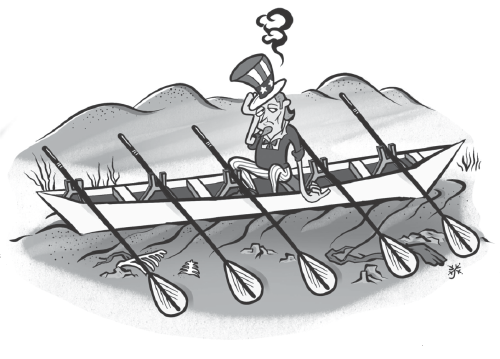ASEAN will not pick sides to harm regional stability
Updated: 2016-02-19 07:58
By Xu Liping(China Daily)
|
||||||||
 |
|
MA XUEJING/CHINA DAILY |
The just concluded meeting between leaders from the United States and the Association of Southeast Asian Nations at Sunnylands Rancho Mirage, California, the first for both sides, produced several agreements on economic cooperation, as well as traditional and nontraditional security coordination.
The two-day gathering focused on building a stronger US-ASEAN strategic partnership and economic community. However, Washington's touting of so-called freedom of navigation and binding standards to "demilitarize" the South China Sea has the potential to hijack the interests of ASEAN and its members and further complicate the regional situation.
As he is in his final year in office, US President Barack Obama wants to further his rebalancing to the Asia-Pacific strategy as part of his legacy while he can. Therefore, the meeting outcomes might have been less than satisfactory for him, especially given his desire to exploit the US-ASEAN partnership against China.
Being a key player in the Asia-Pacific affairs, ASEAN is trying to strike a balance between Beijing and Washington, two major regional powers it maintains close relationships with.
In fact, ASEAN has been mature and wise enough to do so in the past years. Most member states, particularly the less developed ones, such as Brunei and Cambodia, have more interest in receiving financial aid and an economic boost from the US, rather than military support, although the Philippines may be an exception. In other words, when it comes to the South China Seas issues, which are basically about territorial disputes and maritime interest clashes between China and a few ASEAN members, the bloc is unlikely to pick a side.
Instead it will give priority to economic improvement, not endorse some-US backed members to confront China.
Like all peace-loving regional players, Beijing has long advocated the demilitarization of the waters. The most noteworthy hindrance to this is the US and its actions.
Driven by its hegemonic ambitions, the US government has significantly enhanced its military presence and intervention in the South China Sea, which does not concern its homeland security at all.
With the claim it is protecting "freedom of navigation", it keeps stirring up trouble in the South China Sea. A US Navy destroyer intruded in Chinese waters off the Xisha Islands last month, and was quickly forced away by the Chinese military. In December, a US Air Force B-52 bomber "accidentally" flew within 2 nautical miles of China's Huayang Reef.
Provocative moves like these are clearly about flexing the US' military muscles, which poses a grave danger to regional peace and stability in the waters, as well as damaging efforts by both China and the US to build a new type of major power relationship, a proactive proposal made by Chinese President Xi Jinping.
The Pacific Ocean is wide enough to accommodate the interests shared by both nations, as Xi said. The proposed new type of major power relationship should be forged with the principles of non-confrontation, non-conflict, and peaceful negotiation.
This year marks the 25th anniversary of the establishment of dialogue between China and ASEAN, and they are expected to expand their cooperation in poverty-alleviation, bridging the digital gap, and their efforts to combat climate change.
The US could cooperate in the same areas with the ASEAN members with no political conditions attached.
As for the South China Sea issues, they have to be carefully dealt with by relevant countries in accordance with the Declaration on the Conduct of Parties in the South China Sea, not those outside the region.
The author is a senior researcher in Southeast Asian affairs at the Chinese Academy of Social Sciences. The article is an excerpt of his interview with China Daily's Cui Shoufeng.
- Global health entering new era: WHO chief
- Brazil's planning minister steps aside after recordings revelation
- Vietnam, US adopt joint statement on advancing comprehensive partnership
- European border closures 'inhumane': UN refugee agency
- Japan's foreign minister calls A-bombings extremely regrettable
- Fukushima impact unprecedented for oceans: US expert

 Stars of Lijiang River: Elderly brothers with white beards
Stars of Lijiang River: Elderly brothers with white beards
 Wealthy Chinese children paying money to learn British manners
Wealthy Chinese children paying money to learn British manners
 Military-style wedding: Fighter jets, grooms in dashing uniforms
Military-style wedding: Fighter jets, grooms in dashing uniforms
 Striking photos around the world: May 16 - May 22
Striking photos around the world: May 16 - May 22
 Robots help elderly in nursing home in east China
Robots help elderly in nursing home in east China
 Hanging in the air: Chongqing holds rescue drill
Hanging in the air: Chongqing holds rescue drill
 2.1-ton tofu finishes in two hours in central China
2.1-ton tofu finishes in two hours in central China
 Six things you may not know about Grain Buds
Six things you may not know about Grain Buds
Most Viewed
Editor's Picks

|

|

|

|

|

|
Today's Top News
Liang avoids jail in shooting death
China's finance minister addresses ratings downgrade
Duke alumni visit Chinese Embassy
Marriott unlikely to top Anbang offer for Starwood: Observers
Chinese biopharma debuts on Nasdaq
What ends Jeb Bush's White House hopes
Investigation for Nicolas's campaign
Will US-ASEAN meeting be good for region?
US Weekly

|

|







